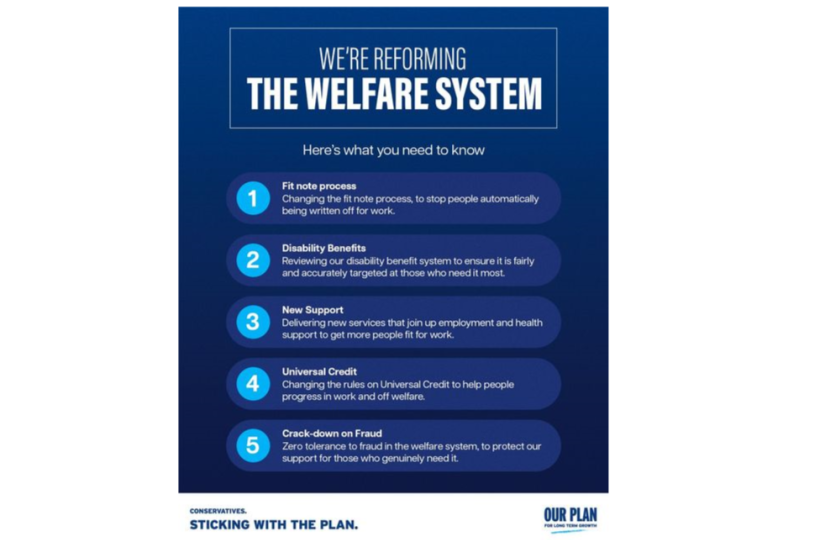
This week, the Prime Minister outlined his plan for ensuring the welfare system supports more people off benefits and into work, helps grow the economy while being sustainable for the future, and directs help to those most in need.
It comes as many more working age people are being awarded PIP for mental health conditions than when it was first introduced over a decade ago, as well as concerns that the assessment process is significantly easier to game by individuals who seek to exploit the system.
In 2019, there were an average of around 2,200 new PIP awards a month in England and Wales where the main condition was anxiety and depression - this has more than doubled to 5,300 a month last year. This is driving up the cost of the disability benefits bill at an unsustainable rate and PIP spending alone is expected to grow by 52% from 2023/24 to £32.8bn by 2027/28.
Total spending on benefits for people of working age with a disability or health condition increased by almost two-thirds to £69 billion since the pandemic, and we now spend more on these benefits than our core schools’ budget or on policing. Given the significant change in caseload and unsustainable increase in costs, it’s clear our current disability benefit system for adults of working age is not fit for purpose.
The Prime Minister has set out his ambition to redesign the disability benefits system to ensure it is fair and compassionate, but also sustainable and fit for the future. A consultation, due to be launched shortly, will consider whether alternative interventions to cash payments – such as treatment or access to services – could drive better long-term outcomes particularly for individuals who have less severe or well managed health conditions.
The plan includes:
- Reform how we assess someone’s capability to work. Over the last decade, the world of work has changed, yet the way the welfare system determines people’s fitness to work has not. Under the Work Capability Assessment, too many people are being written off as unable to work. That is why we are reforming the system so that benefit recipients with less severe health conditions are expected to engage with employment. The OBR has confirmed that this will reduce the number of people assessed as not needing to prepare for work by 424,000 by 2028-29.
- Improve the fit note system to stop people being written off as not fit for work by default. We will instead design a new system where each fit note conversation starts with an assumption of what work people can do with the right support in place, rather than focusing on what they can’t do. We are publishing a call for evidence on how the current process works and how it can better support people with health conditions to start, stay, and succeed in work.
- Review our disability benefit system to ensure that our support is fairly and accurately targeted at those who need it most. We will bring forward a consultation on the Personal Independence Payment (PIP). This will look at the accuracy of PIP assessments, making the system more individually tailored, and ensuring that it is more joined up with local services.
- Change the rules so that someone working less than half of a full-time week will have to look for more work. Before 2022 someone could work only 9 hours a week and remain on benefits without being expected to look for more work. From next month, individuals will be required to work twice as much (18 hours).
- Strengthen our sanctions regime to ensure unemployment benefit remain a safety net not a lifestyle choice. Anyone who does not comply with conditions set by their Work Coach, including accepting an available job will, after 12 months, haver their claim closed, and benefits removed entirely.
- Invest £6 billion in employment support to help people into work. This includes the Universal Support programme, which will match people with a personal advisor who works with local employers to identify jobs, and WorkWell, a new scheme connecting disabled people to the work and health support. Our new occupational health framework will provide expert advice and support to prevent people leaving work due to illness.
- Accelerate the final rollout of Universal Credit, moving all those left on outdated systems, such as ESA, onto the simpler dynamic benefit which eliminates the choice between work and welfare.
- Continue our zero-tolerance approach to fraud. We will introduce a Fraud Bill in the next Parliament to bring DWP’s powers in line with that of HMRC so we can treat benefit fraud like we do tax fraud.
Richard Fuller MP said:
We have taken significant steps over the last 14 years to reform the broken welfare system we inherited from Labour by putting work at the heart of welfare through Universal Credit and boosting pay by cutting taxes for 27 million working people.
We have almost halved the unemployment rate and our employment rate is fourth highest in the G7, higher than the US, France, and Italy. There are nearly four million more people in work since 2010; we have provided a £900 tax cut to almost 30 million people, as we work towards ending the double tax on work. The National Living Wage is now at record levels, ensuring the lowest paid get a fair wage. There are 2.2 million more disabled people in employment in the last decade and there were 1.1 million fewer people in absolute low income after housing costs in 2022-23 compared to 2009-10.
However, post-pandemic, we must now go further to ensure the welfare system is working for both claimants and taxpayers.
That is why this plan for welfare will change the rules so that someone working less than half of a full-time week will have to look for more work, while strengthening the sanctions regime and ensuring unemployment benefits remain a safety net, not a lifestyle choice. We will also stop people being automatically written off as not fit for work, and review and reform our disability benefit system.
Taken together, our plan will create a welfare system that provides vital support for those who need it most, ensuring they are supported to live with dignity and independence, whilst making sure that everyone who can work is expected and supported to do so.

